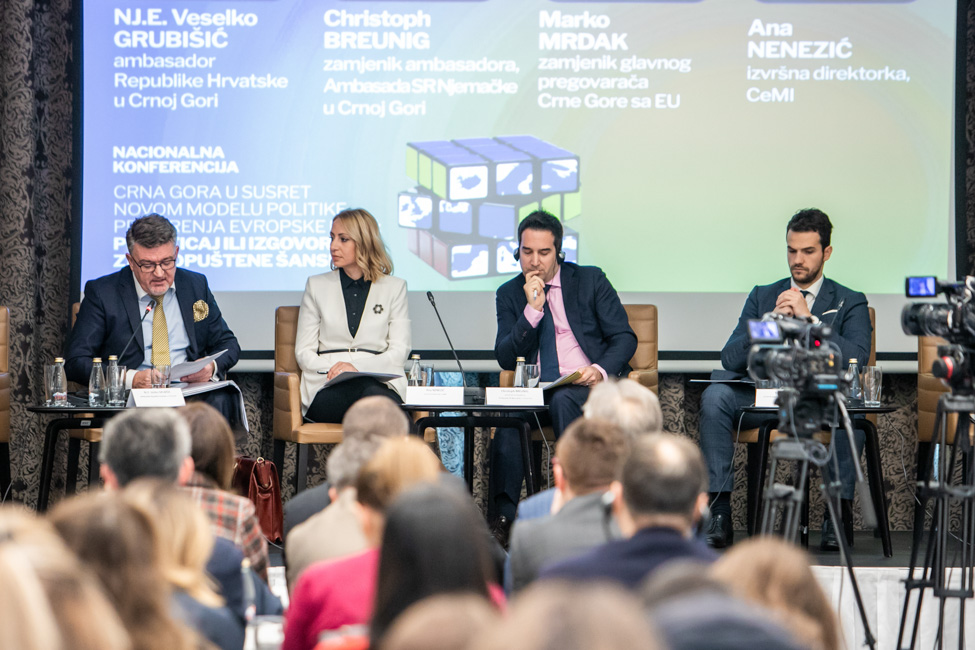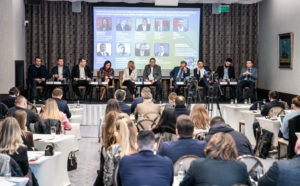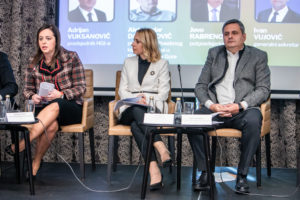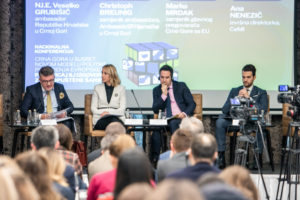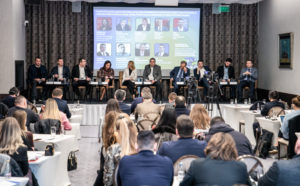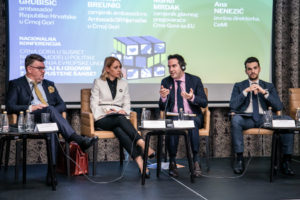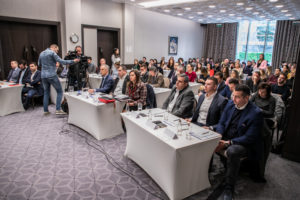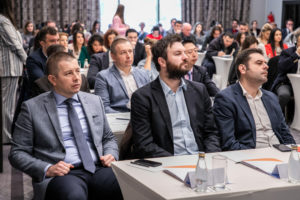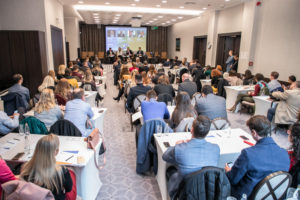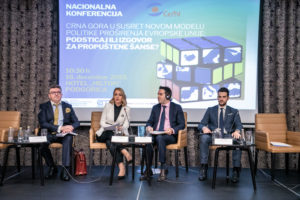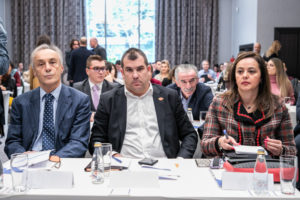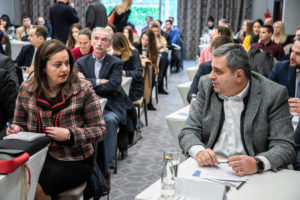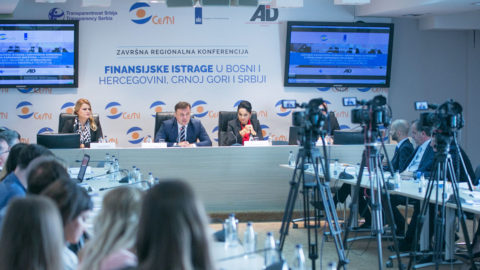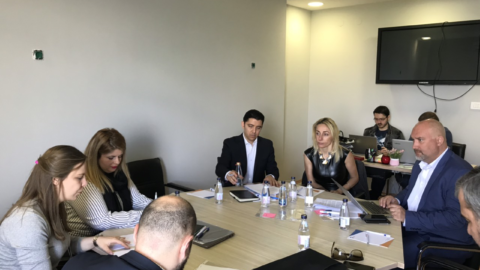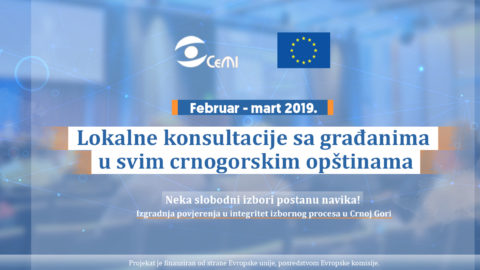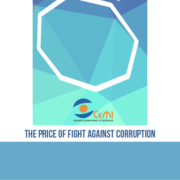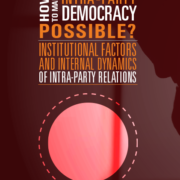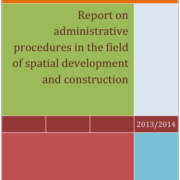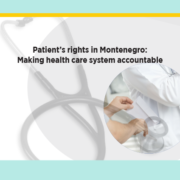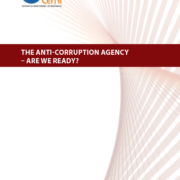Developments within the EU cannot be an excuse for the lack of institutional resolution on key affairs in Montenegro which keep on “shaking” the Montenegrin society, and reform processes should deliver measurable results in order to increase the popular support towards the European community.
This has been announced at the National Conference “Montenegro in the light of the new model of EU enlargement policy: an encouragement or an excuse for missed opportunities?”, which has been organized by the Centre for Monitoring and Research.
Ana Nenezić, the Executive Director of CeMI pointed out that it is possible to make an overview of the fulfilled promises, which were given in 2016 by the executive power standing behind the EU integration process, referring to the Prime Minister Marković’s declaration that by this time all the chapters and the negotiation process would be closed.
“And where do we stand today? Montenegro still has not been able to open all negotiation chapters. We do not even have the final benchmarks for Chapters 23 and 24, whilst the European Commission’s reports are becoming increasingly critical and concrete, and less diplomatic as usual for Brussels-style vocabulary. The enthusiasm that characterized the beginning of the negotiation process is almost non-existent, as indicated by the latest CEDEM data according to which the that public support towards the process has dropped to 55 %, which is the lowest since 2007”, Nenezić said.
According to Nenezić, one very dangerous construction which has been widely present lately is that “Montenegro has done everything that was up to it, but that the events occurring within the EU do not go in its favor.”
“The question arises whether that is indeed the case? Have we indeed seized the given opportunity, have we substantially implemented the necessary reforms and built independent and politically nonbiased institutions, that is, a system based on the founding European values and principles? Are we really the leader in the region? If we are taking into consideration the length of the negotiations, we certainly are. What do we have as a result? We do not have measurable results of the reforms and the registered decrease of the public support calls for a serious reflection of all structures of the society, “Nenezić said.
She believes that Montenegro has no results when it comes to implementation of reforms and, moreover, that citizens do not feel the benefits of the process which further translate to decreasing support towards the EU.
“I think would be healing for ourselves to admit that developments within the EU are not the reason behind the lacking completion of our homework or institutional resolution of key affairs such as “Audio Recordings”, “Envelope”, “Flats” and many others, nor are the reason behind the persisting political crisis and the lack of a political dialogue, ” Nenezić assessed.
Commenting on the French proposal, Nenezić said that the pace of the reforms is too slow, whilst the deep political, economic and social transformations, which are a key prerequisite of the EU membership, remain invisible.
“I think it is difficult to imagine the application of this methodology to the accession process of Montenegro, which has already opened most of the chapters. The four principles that the French non-paper promotes are hardly applicable in Montenegro’s case,” Nenezić pointed out.
She emphasized that initiatives which followed France’s NO to opening of negotiations with Northern Macedonia and Albania, and which put the Western Balkans and its EU perspective at the top of the EU agenda are favorable to Montenegro.
“We see that the first messages of the President of the EU Commission, the new EU High Representative for Foreign Affairs and the EU Commissioner for Enlargement move in that direction.” It is only a matter of whether our political elites will recognize this moment and assume their responsibility, or we shall continue to miss the opportunities that are being presented to us, concluded Nenezić.
E. Ambassador of the Republic of Croatia to Montenegro, Veselko Grubišić, stated that one of the priorities during Croatian Presidency of the Council of the European Union will be the enlargement.
Speaking about Montenegro’s negotiations with the EU, Grubišić pointed out that one chapter still has not been unopened.
“We hope and believe that this chapter will be opened during Croatia’s EU Presidency. But, although it will be encouraging this process, Croatia does not decide on its own. It is a matter of joint effort, “said Grubišić.
The Deputy Head of the German Embassy to Montenegro, Christoph Breunig, stressed out that the Federal Republic of Germany remains firmly committed to the process of Montenegro’s accession to the EU and other Western Balkan countries.
“We perceive the EU enlargement policy as a basic instrument of stabilization, a driving force of reform processes in all countries. The successful integration of Montenegro and the Western Balkans is not only a matter of regional interest, but is also the interest of the EU and Germany itself”, Breunig said.
He pointed out that Germany is ready to support Montenegro in implementing and carrying out the reforms.
“The implementation of the reforms that lead to tangible results is exactly what the EU accession process is about. It is about improving the quality of life of every citizen. It all comes down to it. When the effects, the results of the reforms begin to reflect on the citizens themselves, then the support for EU will grow to a greater extent”, Breunig said.
Marko Mrdak. Deputy Chief Negotiator for the EU Acquis Chapters, stated that Montenegro’s negotiations are being conducted according to the strictest rules which the EU has ever adopted.
“As a result of such negotiations, Montenegro has positioned itself as a leader in the field of the EU integrations in such a way that we have opened all the negotiating chapters, with the exception of one for which we have received formal confirmation from all EU member states that the initial benchmarks have been met, as well as the three negotiation chapters provisionally closed.
He emphasized that there is no fear as far as Montenegro is concerned that any negotiating framework will affect Montenegro’s pace and commitment in terms of fulfilling its reform activities.
Mrdak said the priorities of the new European Commission and the message of the Commission’s President Ursula von der Lajen are encouraging, and pointed out that the Western Balkans must build a common future, “bearing in mind that we share the same continent, culture and challenges”.
“This further encourages us that the new methodology will go in favor of the Western Balkans, and in primis of Montenegro as the leading candidate for EU accession, and will serve as an additional impeller of the reforms,” Mr Mrdak said.
During the panel “How will the announced reform of EU enlargement policy affect Montenegro’s further accession process: an encouragement or an excuse for missed opportunities?”, Slaven Radunović, the Chairperson of the Committee on European Integration reminded the audience that an informal balance clause is effective.
“The most important thing that the EU integration process should entail is the overall healing of society”, said Radunović. He expressed his satisfaction with the new methodology proposed by the French President Emanuel Macron, whilst also noting that there is a proposal coming from nine different states.
“Seeing Montenegro moving forward in the field of EU integrations is the common objective of both parties. And Montenegrin citizens should be able to see benefits of this process, which is not the case. The new approach allows no one to falsely present itself as a leader. Montenegro was among the first ones when it came to raising hands, passing legislation or checking the boxes, but it was not the case when it came to effective implementation.
Answering the question of the participants, Radunović emphasized that mini-Schengen can only be beneficial for Montenegro for the simple reason that it seems illogical that we prefer to cooperate with those who are much farther away instead of the ones who are closest to us.
Daliborka Pejović, member of the Committee on European integration from the Democratic Party of Socialists (DPS), said that there are different points of view and interpretations of the European Commission reports.
“The EC reports are both technical and political. In a technical sense, we mostly get positive ratings and accolades, while in a political sense it depends on the circumstances” – Pejović said.
She said that during the visit of the French delegation to the Parliament of Montenegro, nobody stated that the problem lies in Montenegro or its negotiation process but rather in ”dissatisfaction with the EU “.
Speaking of the Committee on Comprehensive Reform of Electoral and Other Legislation, she said that “there is no obstruction of its work “.
„As stipulated by the Constitution, we can’t adopt any law regarding the election of councilors and deputies without a required two third majority, which we cannot do on our own.”
Dragan Krapović, the Vice President of Democratic Montenegro believes that Montenegro should fulfil the EU standards “in terms of its effective transformation into a contemporary European democracy “.
„First thing that characterizes such a democracy are fair elections. We never had free elections nor the change within the governing structure following the elections. That’s a serious limitation and handicap”, Krapović pointed out.
He noted that adopting new election rules and forming a technical government are a necessity.
Krapović said that Democrats, as part of the Committee on Comprehensive Reform of Electoral and Other Legislation, have submitted 16 draft laws, almost 200 decisions and that “it’s a fact that DPS hasn’t signed nor processed a single one of them, and we don’t know what their formal stance is“.
The President of DEMOS, Miodrag Lekić, believes that the Macrons’ concept deserves attention.
“The EU has its paradox – the bigger it is, the weaker it gets. It is expanding in terms of its members states, but the quality of its performance is decreasing, “ Lekić said.
The process of enlargement, he recalled, is based on two substantial elements.
“One is the Copenhagen Criteria – meeting the standards. The second is the geopolitical context. In 2004, ten countries became the EU member states as the political context, at the time, was favorable. The criteria were not too strict then, ” Lekić said.
The Vice President of the Civic Movement URA, Filip Adžić, believes both sides should be held accountable for the stalemate in Montenegro’s EU negotiations, “but the dominant culprit for the current situation is the governing structure and the people leading the accession process.”
“The culprit is on the other side as well, and it lies in the countries that are currently pushing for a model which was acceptable to Montenegro. The timing of the new model which is being promoted by France is problematic, as in the recent period we kept on receiving the encouraging feedback. Lately, Montenegro, which has been repeatedly denominated as the champion in the negotiation process, only to now receive a lot of criticism and to be met with sharp reactions, indicating that the negotiation process is not at the stage where it should be and that Montenegro has not met the expected requirements”, said Adžić.
He said that, although supportive of the French model, it could lead to a certain degree of stagnation when it comes to democratization processes of the Montenegrin society.
The President of the Croatian Civic Initiative, Adrian Vuksanović, believes that the process of European integration is about reflecting and “facing oneself”.
“None of us says that we have completed everything we need to. If that was the case we would no longer be in the process, “Vuksanović said.
He believes the new methodology can be beneficial.
“If we are going to get the benefits following the completion of the certain negotiating chapters, then our citizens will be able to see the concrete nature of the EU accession process”, Vuksanović said.
Representative of the United Montenegro, Dušan Slijepčević believes that Montenegro cannot make further progress in the EU negotiations if it does not start dealing with the substance instead of the form.
“The essence does not lie in the mere adoption of the legislation. The dialogue needs to be established between the opposition and the ruling coalition. This is something that our international partners keep suggesting to us, but so far no progress has been made when it comes to establishing both the aforementioned mentioned dialogue and there’s been no progress between us in the opposition. We need to demonstrate a sense of unity and show our fellowship to the government, and then to make a further step towards the EU, ” said Slijepčević.
The Vice President of the Liberal Party (LP), Jovo Rabrenović reminded that the EU membership has been their party’s goal since its inception.
“We continue to believe that the EU is the best model for the functioning and coexistence of all Western Balkan countries,” Rabrenović said.
The Secretary General of the Social Democratic Party (SDP), Ivan Vujović, said that Montenegro had entered the second half of the eighth year of the negotiation process.
“Can anyone say that there is more democracy and the rule of law today than it was five or six years ago. I think hardly anyone can answer in the affirmative. This is what should concern us both as a political community and a society. With all this in mind, we should not wonder why support for Montenegro’s membership is at a historic minimum,” Vujović said.
He believes that a hint of a new approach is an opportunity and expects the EU member states to build consensus regarding this matter.
The conference, which brought together around hundred representatives of diplomatic missions, political parties, non government organizations and media, was organized within the project “Evolving or revolving: Institutional reforms and democratic legitimacy in Kosovo, Albania, and Montenegro”, which is being implemented by the Centre for Monitoring and Research (CeMI), Democracy for Development and European Movement Albania, with the support of European Fund for the Balkans, as a joint initiative of the Robert Bosch Foundation, the ERSTE Foundation and the King Baudouin Foundation through “Think and Link- Regional Policy Programme”.


 Montenegrin
Montenegrin